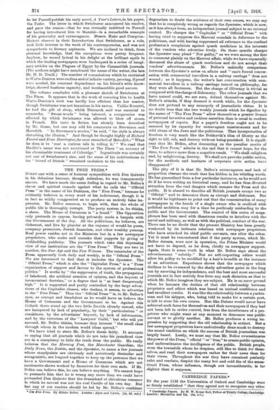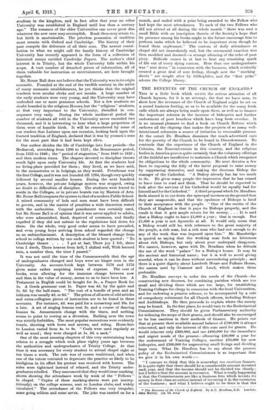CAMBRIDGE PAPERS.* BY the year 1133 the Universities of Orford
and Cambridge were so firmly established "that they agreed not to recognize any other
• Cambridge Papers. By W. W. Row* Ball, Fe/low of Trinity Collcge,eambridge
London ; Macmillan and Co. fea. net.] . studium in the kingdom, and in fact after that year no other University was established in England until less than a century ago." The romance of the older Universities can never grow dim whatever the new ones may accomplish, Rank these may attain to, but birth is unattainable. The priceless possession of tradition must remain with Oxford and Cambridge. The history of their past compels the deference of all their sons. The newest contri- bution to what we might call the family history of Cambridge University has recently appeared in the form of a collection of historical essays entitled Cambridge Paper& The author's chief interest is in Trinity, but the whole University falls within his scope. A vast number of detached pieces of information, all of them valuable for instruction or entertainment, are here brought together.
Mr. Rouse Ball does not believe that the University was in its origin monastic. Founded at the end of the twelfth century in the midst of many monastic establishments, he yet thinks that the original teachers were secular clerks and not monks. A large number of the early students were very young, and the University may have embodied one or more grammar schools. Not a few students no doubt boarded in the religious Houses, but the "religious" students, at first very important to the University, dwindled in con- sequence very early. During the whole mediaeval period the number of students all told in the University never exceeded two thousand, and it is interesting to hear what a large proportion of them were of humble birth. It will be remembered by some of our readers that Latimer upon one occasion, looking back upon the learned tradition of England, declared that it was by yeomen's sons for the most part that it had been kept alive.
Our author divides the life of Cambridge into four periods—the Mediaeval, stretching from 1200 to 1525; the Renaissance period, from 1525 to 1640; the" period of stagnation," from 1640 to 1820; and then modern times. The chapter devoted to discipline throws much light upon early University life. At first the students had no living-place provided for them ; they lived, as we have said, in the monasteries or in lodgings, as they would. Peterhouse was the first College, and it was not founded till 1284, though very quickly followed by several smaller houses. During the next hundred years, however, the private lodgings system was stopped, owing no doubt to difficulties of discipline. The students were forced to reside in the Colleges, or in private hostels run by Masters of Arts. Mr. Rouse Ball compares the system to that of a modern Public School. A mixed community of lads and men must have been difficult to govern, and in the matter of penalties a wide discretion rested with the authorities. Corporal punishment was certainly used, but Mr. Rouse Ball is of opinion that it was never applied to adults, who were admonished, fined, deprived of commons, and finally expelled if they did not submit to the regulations laid down for them. On the whole, very good order seems to have prevailed, and even young boys arriving from school regarded the change as an enfranchisement. A description of the blessed change from school to college written by one such student is here quoted: "To Cambridge thence . . . I got at last, There joy I felt, there trim I dwelt, There heaven from hell, I shifted well, With learned men, a number then, the time I passed."
• It was not until the time of the Commonwealth that the age of undergraduates changed and boys were no longer seen in the University. An account-book kept between 1570 and 1576 gives some rather surprising items of expense. The cost of books, even allowing for the immense change between now and then in the value of money, seems to us to have been low. A Testament in English could be bought for 2s., a Prayer Book for Is. A Greek grammar cost Is. Paper was 4d. by the quire and 2s. 6d. by the half-ream. "The cost of a bundle of pens and an inkhorn was usually 4d. or 6d." The prices of all sorts of odd articles and extra-collegiate pieces of instruction are to be found in these accounts. For instance, 4d. was paid for a mousetrap- and 10s. for a lute. A set of singing lessons cost 3s. and a course of dancing lessons Os. Amusements change with the times, and nothing seems to point to rowing as a diversion. Bathing near the town was strictly forbidden. The most popular recreations were evidently -tennis, Shooting with bows and arrows, and riding. Horse-hire to Lendon varied from 4s. to 8s. "Coals were used regularly as well as wood ; they were charged at ls. 3d. a sack."
One of the most amusing chapters of this very entertaining book relates to a struggle which took place eighty years ago between the authorities and undergraduates of Trinity College. At that time it was necessary for every student to attend chapel eight or ten times a week. The rule was of course traditional, and when one of the tutors ventured to deprecate the practice as likely to be irreligious in its effect his protest was received with horror. The rules were tightened instead of relaxed, and the Trinity under- graduates rebelled. They announced that they would issue marking- sheets- showing the attendance week by week of the " Fellows " in chapel. "Copies of these marking-sheets were put (surrep- titiously) on the college screens, sent to London clubs, and widely lireulated." The -attendance of the Fellows was very irregular, some going seldom and soine never. The jokewas Carried on for a month, and ended with a prize being awarded to the Fellow who had kept the most attendances. To each of the two Fellows who did not attend at all during the whole month "there was sent a small Bible with an inscription therein of the Society's hope that its presence among his books might in the future encourage him to perform tasks which he believed to be important even though he found them unpleasant." The custom of daily attendance at chapel did not immediately end, but the ceremonial exaction was then modified and doomed—a strange silencing of the echo of past piety. Ridicule comes in at last to beat any remaining spark of life out of every dying custom. More than one undergraduate was "sent down" in connexion with the business, which evidently created a great deal of sore feeling, though now the "marking sheets" are sought after by bibliophiles, and the "first prize" adorns the College library.



























 Previous page
Previous page